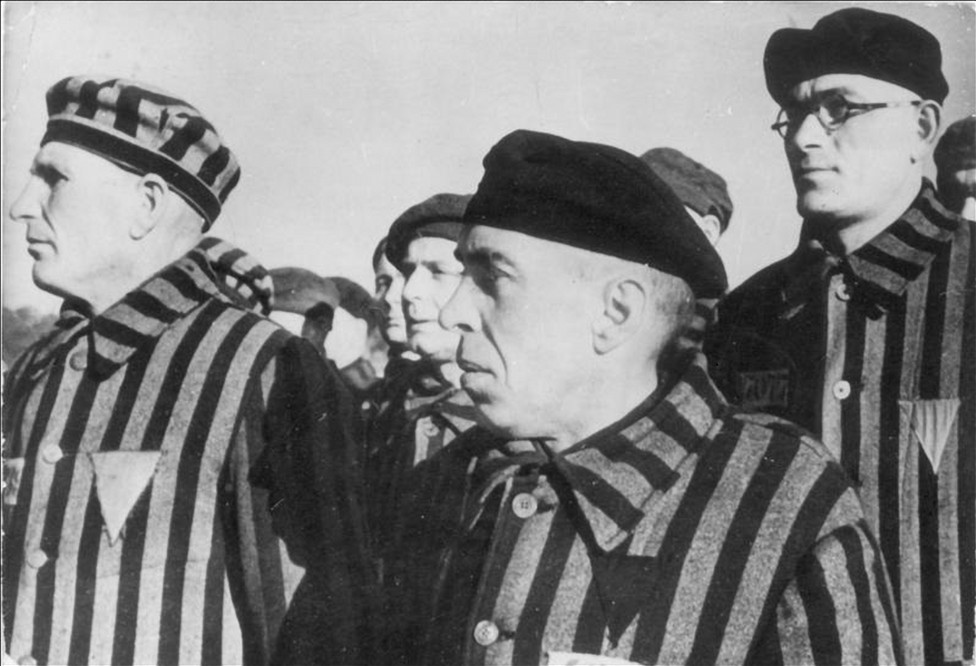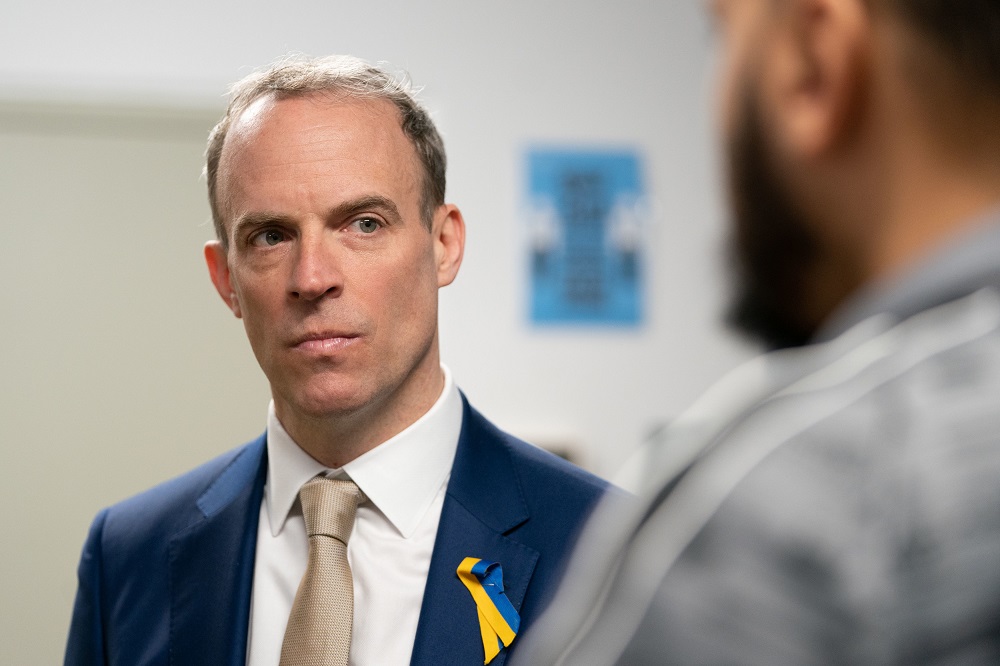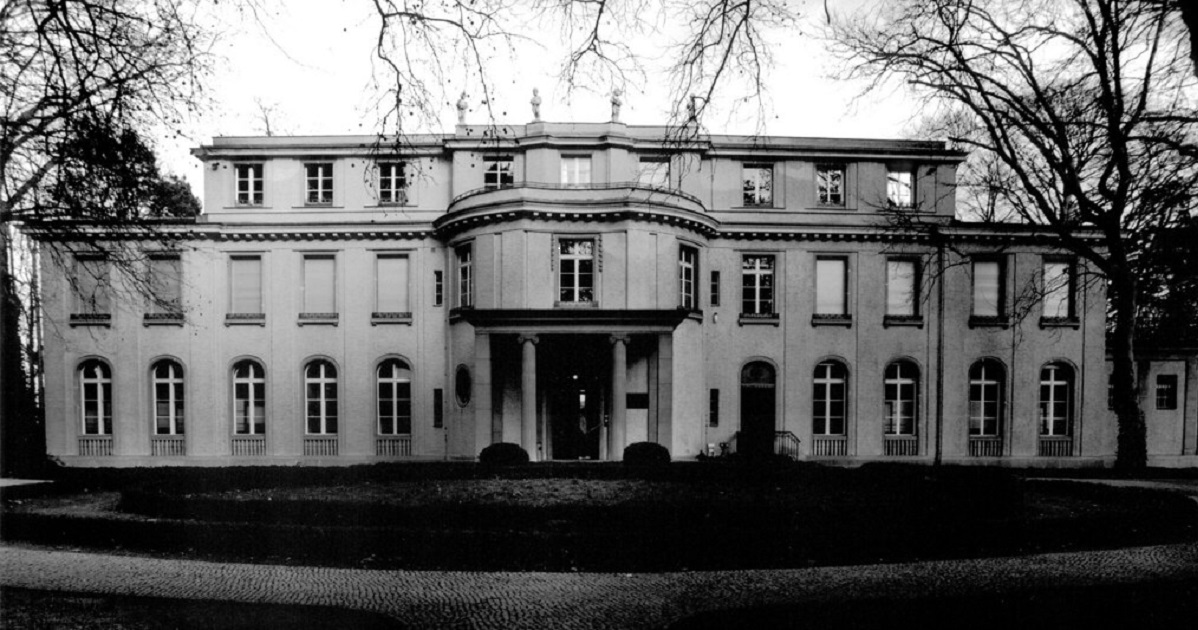Wannsee and the F-Word

David Llewellyn
Coined in 1991 by attorney and writer Mike Godwin the term ‘Godwin’s Law’ states that the longer an internet discussion goes on the greater the likelihood that someone will make a comparison with Hitler and the Nazis.
Direct comparisons are often grotesquely disproportionate, but what about Fascism?
The word originates from fasces, the bundle of sticks used as a symbol of strength in Ancient Rome, later meaning organisations or guilds, before arch neo-classicist Benito Mussolini founded his National Fascist Party in 1921.
In the present day, we might justifiably describe Putin’s invasion of Ukraine as fascistic, and if Donald Trump’s anti-immigrant rhetoric, his refusal to accept defeat and the ensuing insurrection by his supporters don’t count as fascism, what does?
The question of what constitutes fascism was raised once more by Mhairi Black MP, in a recent speech about the UK Government’s incompetence, and its slide into authoritarianism.
In it, she referred to “The F Word”, making it clear she meant fascism, perhaps the first time in recent years that a politician has levelled this charge at a sitting government with such conviction.
I was reminded of her speech while listening to a Radio 3 news bulletin in which we learned that Justice Secretary and Deputy Prime Minister Dominic Raab has introduced a bill that will allow his government to overrule the European Court of Human Rights.
This follows a recent ruling by the ECHR that the UK’s plan to send refugees from various countries to Rwanda is unlawful, putting a halt to the first scheduled flight.
As I listened, the name and place that came to mind was Wannsee.

Array of badges
It was February 1996, and I was on a History A-Level field trip to the recently unified Berlin, having travelled there, with twelve other students and two teachers, in Coleg Gwent’s clapped-out minibus.
In the nights, accompanied by our local guide, we went to underground bars where modern Berliners played the Blues, often letting us join in. My full-throated performance of Muddy Waters’ Mannish Boy got me one too many altbiers, paid for by the locals.
Those nights were how we unwound following days on which we visited places such as Sachsenhausen, where hundreds of thousands were killed by the Nazis and their Stasi successors, and the imposing Soviet Memorial and mass grave at Treptower Park.
On the same day that we visited the house in Potsdam where Roosevelt, Churchill and Stalin carved up Europe, we were also taken to a mansion overlooking Großer Wannsee.
It’s now a Holocaust memorial and museum but on January 20 1942 it was where Reinhard Heydrich, Adolf Eichmann and others met to discuss what should happen to the millions of Jews and other non-citizens imprisoned in the Reich’s concentration camps.
It was February when we went there in ’96, only weeks after the 53rd anniversary of that meeting.
It was cold, the lake frozen – even the ripples on its surface had paused – and there was no birdsong.
One of the museum’s displays had an array of badges worn by those persecuted by the Nazis. There, between the different badges for Jews, gypsies, socialists and many more was a pink triangle, and I pointed it out to my friends, telling them it was the one I would have had to wear.
We had set out for the day in high spirits, following another late night in some friendly Berlin dive bar, but we drove back to Neukölln in near silence.
Banality of Evil
Years later I saw the film Conspiracy, starring Kenneth Branagh as Heydrich and Stanley Tucci as Eichmann, which conveys to chilling effect the participants’ appalling matter-of-factness.
I would go on to read Hannah Adrendt’s superb account of Eichmann’s trial in Jerusalem, in which she coined the phrase ‘The Banality of Evil’.
This nerdy looking desk jockey, so ordinary, was the architect of millions of deaths, but before sending those people to the gas chambers and death from malnutrition or typhoid he had once proposed sending them all to Madagascar.
Few of the men seated around the table were soldiers, they were mostly politicians and civil servants, tasked with handling the administrative and bureaucratic side of industrialised mass slaughter.
Together they had reached a moment in which they could discuss this coolly, following a decade of state-endorsed persecution and propaganda, during which the subjects of their ire were dehumanised to the point of being disposable.
It goes without saying that the Holocaust is beyond compare with anything happening in the UK in 2022.
It was an atrocity on a scale that few of us can ever begin to fathom, even when there are many books, programmes and films about it.
The official Twitter account for the Auschwitz Memorial posts regular images and short biographies of the men, women and children slaughtered by the Nazis, giving names and faces to the millions who were killed, perhaps the best and most profoundly moving way to approach it.
That is why, on listening to that bulletin I thought not of the images taken after the liberation of the camps, though they are seared indelibly into our collective memory.
What I thought of was Wannsee.

Selective populism
In the history lessons that preceded and followed the trip we were often asked what we would have done if we had been German civilians at the time of the Nuremberg Laws, the first bureaucratic steps towards a Final Solution.
I said I’d stand up to the Nazis, with all the bravado of an 18-year-old, though I’m glad I did.
The author and philosopher Umberto Eco, who grew up in Mussolini’s Italy, wrote a check list of the warning signs of fascism.
It begins with a cult of tradition, celebrating your country’s past as a golden age to which it must return.
It moves on through a rejection of modernism, a cult of action for its own sake, labelling dissent as treason, the fear of outsiders, appeals to the frustrations of the common man, and a selective populism.
In February 2020, shortly before the first lockdown, my partner and I were on a train to Stoke, to attend the opening of an exhibition he was in at the Potteries Museum.
On our way there we were joined by a large group of Charlton Athletic fans, on their way to a match against Stoke City.
Their conversation went from vile racism to misogyny and homophobia, rounded off with triumphant declarations that they had “Got Brexit done”, and choruses of approval for Boris.
It was my first glimpse of what Britain had become with him as its Prime Minister.
Two years later, and his government has outlawed protest, voiced its disdain for the Black Lives Matter movement, and gas lit Black British people with its widely condemned race report.
It has removed anti-capitalist books from school libraries and declared war against its current boogieman, “Wokery” in universities.
It labels those fleeing war torn homelands and persecution “illegal” because they came here via the most desperate, dangerous and only means available, and plan to outsource that process to a remote country with a terrible human rights record, a place many of those refugees have never set foot in.
They describe this as a “deterrent”, much as we might talk about the most severe punishments meted out to criminals.
So when our Home Secretary says we’ll place electronic tags on refugees, while our Justice Secretary talks blithely about overruling an international court, I think of Wannsee, a display case full of badges, and a frozen lake.
David Llewellyn is a novelist and script writer. He grew up in Pontypool and graduated from Dartington College of Arts in 2000.
Support our Nation today
For the price of a cup of coffee a month you can help us create an independent, not-for-profit, national news service for the people of Wales, by the people of Wales.






Shout it from the rooftops my friend, it is being welcomed with open arms by far to many in this country, as is the domination of women by those across the ocean…when I see Raab in my mind’s eye he is dressed in black, him and his international brigade of ghouls! Cofiwch Awst 2…
Fascism is a bit old hat as it fails to capture the characteristics of those who you might describe as “Left” > Far Left. Supremacist authoritarian is a bit cumbersome but captures the overarching “we’re always right, so do as we tell you” message that flows from most of the political spectrum today, be they old fashioned Right or Left.
Ooft. Sorry for the long one Mr Davies, but you got me thinking (peryglus iawn, ond co’ ni ‘ma) The article, unfortunately and ironically, falls into the same trap Godwin was trying to highlight in his famous ‘law’: if you have little understanding of a term, the history behind it and the aptness of its use, you probably shouldn’t use it. The author’s examples are so far off, misses key definitional context for ‘fascism’ (perhaps due in part to, assuming he is left of centre, the ironically fascistic turn the contemporary Western Left has taken in adopting a ‘no truth… Read more »
You ought to ask the boss at N.C to reproduce that note as a separate article. It might need a bit of editing or reshaping but you have the guts of a good script there. I may not agree with some of it but it is miles ahead of the juvenile “my way or no way ” junk that gets turned out by some contributors here and in other online publications. Diolch o galon. Daliwch ati.
Powerful article. I think it a big stretch to think that at the moment we live in a fascist state or have a fascist government and political leaders (with a few exceptions). However, I have never felt, even under the worst depredations of Thatcherism, that we are as close to the very early beginnings of Nazi type fascism as we are today. The reason? Well again it’s the banality and ease with which the government thinks that rules don’t apply to them and can be either ignored or lightly set aside. That is my main fear for another tory election… Read more »
Both fascism and communism are totalitarian. Totalitarianism which is seen today in various guises not the least in Iran which closely resembles Nazi Germany in structure tends to clothe itself in the culture and ideology of the people or state who promote or adopt it. So Nazism has a German flavour, Communism a Russian flavour and so on. Fruitless discussions hairsplitting definitions don’t help. Totalitarianism wrecks lives and countries. Today it is again becoming widespread and dangerous.
It all begins gently and even the good guys can be bad and vice versa. Early in WW11 Eichmann was negotiating with Zionists to try to get them to accept several hundred thousand Jews he wished to deport from the Reich. Israel rejected such offer and went as far as the bombing of the SS Patria and killing of 260 to 300 Jewish refugees to make their point. Needless to say those hundreds of thousands died. Fascism is and always will be alive and flourishing wherever a nation can be shown to be or is in crisis, wherever the answer… Read more »
Well said David.